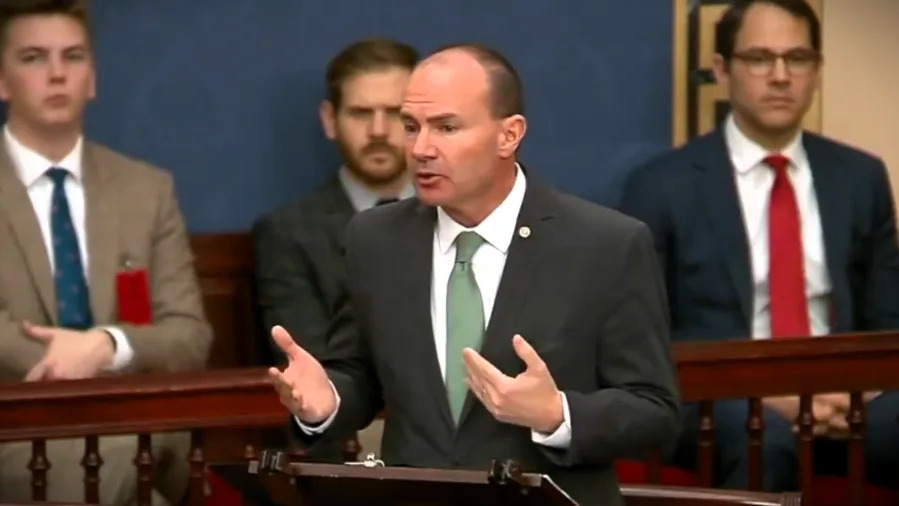Ella Nilsen and Ariel Edwards-Levy, CNN
Fri, December 8, 2023

Michaela Vatcheva/Bloomberg/Getty Images
Nearly two-thirds of US adults say they are worried about the threat of climate change in their communities, according to a new CNN poll conducted by SSRS. More than half are worried about the impact of extreme weather, as the climate crisis touches every region in the form of extreme heat, devastating storms and drought.
Even more want the federal government to do something about it. A broad majority of US adults – 73% – say the federal government should develop its climate policies with the goal of cutting the country’s planet-warming pollution in half by the end of the decade.
That has been the goal of President Joe Biden, who has made tackling the climate crisis a greater priority than any other president, including through billions of dollars in tax subsidies to create more renewable energy infrastructure and help consumers buy discounted electric vehicles, solar panels and energy-efficient appliances. The Biden administration is also crafting and implementing several federal regulations designed to cut pollution from the oil and gas industry, power plants, and gas-powered vehicles.
The polling comes as nations debate the future of fossil fuels at the COP28 climate summit in Dubai in the United Arab Emirates. Vice President Kamala Harris announced at the summit last week that the US would commit another $3 billion to the global climate action fund, and the Biden administration announced new rules to slash emissions of methane – a powerful planet-warming gas – by 80% from the US oil and gas industry.
Cutting US climate pollution is a bipartisan aspiration, the CNN poll finds. Nearly all Democrats say the US should slash its greenhouse gas emissions by half by 2030, and 76% of independents and half of Republicans agree.
American voters could be presented with a stark choice on how their country addresses climate change in the 2024 election; a potential rematch between Biden – who signed the country’s biggest climate investment into law last year – and former President Donald Trump, a climate change denier who has vowed to repeal several of Biden’s signature clean-energy policies.
When it comes to climate change, Americans say by a 13-point margin that their views align with Democrats more than Republicans. Much like abortion, climate change is one of the strongest issues for Democrats, CNN’s poll finds.
Americans give Biden a 43% approval rating for his handling of environmental policy, which is several points above his overall approval rating and well above his numbers for handling the economy. But few Americans, only 2%, see climate change as the most important issue facing the country, giving higher priority to the economy and cost of living.
But climate change and clean energy are increasingly intertwined with the economy. Climate change-fueled disasters don’t just impact commerce, they also strike at the heart of the American dream: homeownership.
In some states prone to wildfires and extreme weather, the cost of home and property insurance is skyrocketing. In some cases, insurance companies are dropping coverage all together because the risk is too high. That, in turn, has damaging implications for the housing market and cost of homes, experts have told CNN.
Most US adults say humanity bears a great deal of responsibility to try to reduce climate change but believe the US and Chinese governments and the energy industry are all doing too little to fix the problem.
Americans are also finding less fault with themselves: A somewhat lower 40% of Americans say that people like them hold a great deal of responsibility to reduce climate change. Meanwhile, 58% say that they, personally, are doing the right amount to reduce their impact on the climate crisis, with 37% saying that they are doing too little.
As past polls have found, there is a profound partisan divide over how Americans feel about climate change, and what to do about it, that outweighs other factors such as age and gender. The poll finds Democrats are far more likely than Republicans to say that humanity bears a great deal of responsibility to reduce climate change (77% vs. 42%). And Democrats are 36 percentage points likelier than Republicans to say they’re very worried about the risk of climate change in the communities where they live.
But the fact that human activity is fueling the planet’s warming isn’t lost on Republicans; the poll finds about three-quarters of them think humanity has at least some responsibility to fight climate change.
The poll finds that more than 4 in 10 Americans say they’ve experienced extreme weather over the past year, with most in that group calling climate change a contributing factor. In the past few years, Americans have faced climate-fueled extreme heat, drought and flash flooding that has devastated communities.
The CNN poll was conducted by SSRS from November 1-30 among a random national sample of 1,795 adults initially reached by mail. Surveys were either conducted online or by telephone with a live interviewer. Results for the full sample have a margin of sampling error of plus or minus 3.2 percentage points; it is larger for subgroups.
ICYMI
Half of Republicans in new poll support Biden push to cut emissions
Nick Robertson
THE HILL
Fri, December 8, 2023

Among nearly three-quarters of Americans who said in a new poll that they want the federal government to design policies around a goal of halving greenhouse gas emissions by 2030, half of Republicans joined Democratic respondents, bucking party lines and showing significant support for Biden administration commitments to fighting climate change.
The CNN poll released Thursday found about two-thirds of respondents are worried about the impacts of climate change on their communities, and nearly 60 percent are worried about increasing extreme weather.
The results come as world leaders gather at the COP28 climate summit in Dubai to discuss climate change policy. Negotiations have focused on the fossil fuel industry, but they face setbacks as some nations cling to fossil fuel revenues to support their economies.
Last week, Vice President Harris pledged $3 billion at the summit to help developing countries’ climate policy, including investing in green energy.
The Biden administration has also allocated billions in tax breaks for purchasing electric vehicles, solar panel arrays and appliances, and it has implemented regulations to reduce industrial emissions.
Those policies are popular, the poll found, with about two-thirds of poll respondents saying each of the policy initiatives should either be a top priority of the government or is important.
Despite support for underlying policy, a slight majority still disapprove of how Biden has handled environmental issues, according to the poll. Only 43 percent of Americans and 11 percent of Republicans approve of Biden’s environmental record.
At the same time, another 58 percent of Americans say the federal government isn’t doing enough to fight climate change, with just a quarter saying it is doing “just the right amount” of work.
The CNN poll surveyed about 1,800 people reached by mail last month, with a margin of error of 3.2 percentage points.
Fri, December 8, 2023

Among nearly three-quarters of Americans who said in a new poll that they want the federal government to design policies around a goal of halving greenhouse gas emissions by 2030, half of Republicans joined Democratic respondents, bucking party lines and showing significant support for Biden administration commitments to fighting climate change.
The CNN poll released Thursday found about two-thirds of respondents are worried about the impacts of climate change on their communities, and nearly 60 percent are worried about increasing extreme weather.
The results come as world leaders gather at the COP28 climate summit in Dubai to discuss climate change policy. Negotiations have focused on the fossil fuel industry, but they face setbacks as some nations cling to fossil fuel revenues to support their economies.
Last week, Vice President Harris pledged $3 billion at the summit to help developing countries’ climate policy, including investing in green energy.
The Biden administration has also allocated billions in tax breaks for purchasing electric vehicles, solar panel arrays and appliances, and it has implemented regulations to reduce industrial emissions.
Those policies are popular, the poll found, with about two-thirds of poll respondents saying each of the policy initiatives should either be a top priority of the government or is important.
Despite support for underlying policy, a slight majority still disapprove of how Biden has handled environmental issues, according to the poll. Only 43 percent of Americans and 11 percent of Republicans approve of Biden’s environmental record.
At the same time, another 58 percent of Americans say the federal government isn’t doing enough to fight climate change, with just a quarter saying it is doing “just the right amount” of work.
The CNN poll surveyed about 1,800 people reached by mail last month, with a margin of error of 3.2 percentage points.

















